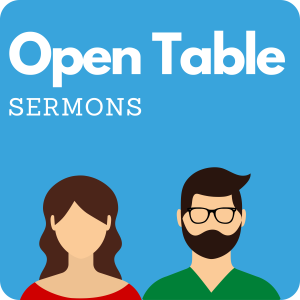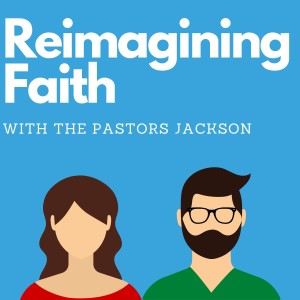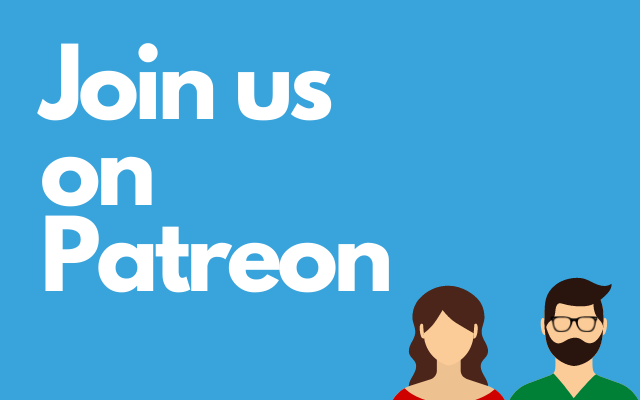Reimagining Faith with the Pastors Jackson
Nichole and Zack Jackson are the pastors of Open Table UCC in Pottstown, PA. We left our separate churches in May of 2022 to plant a new faith community that is theologically progressive, Pottstown focused, with Jesus at the center. We want to unpack what all that means while also giving you an inside-look into the messiness of starting a new church. We’re going to talk to some incredible difference-makers while taking a deep dive into matters of justice, equality, and the revolutionary stories within the Christian scriptures. You can support this work on Patreon at https://www.patreon.com/reimaginingfaith
Episodes

Thursday Apr 27, 2023
”Recognizing God in the Familiar” a Sermon by Pastor Nichole Jackson
Thursday Apr 27, 2023
Thursday Apr 27, 2023
This sermon was delivered by Pastor Nichole Jackson on Sunday, April 23rd 2023. Check out the full service at the link below...
https://youtube.com/live/CixFmv6Y7tU?feature=share
Come join us either in person or online on Sunday mornings at 10am.
https://www.opentablepottstown.com/

Friday Apr 14, 2023
”Love Like Gravity” a Sermon by Pastor Zack Jackson
Friday Apr 14, 2023
Friday Apr 14, 2023
This sermon was delivered by Pastor Zack Jackson on Easter Sunday, April 9th 2023. Check out the full service at the link below...
https://youtube.com/live/VCIDXChBNzM?feature=share
Come join us either in person or online on Sunday mornings at 10am.
https://www.opentablepottstown.com/

Tuesday Mar 21, 2023
The Laramie Project with Stacey Michaud
Tuesday Mar 21, 2023
Tuesday Mar 21, 2023
Episode 19
At Open Table UCC, we say that we are "theologically progressive, Pottstown focused, with Jesus at the center". We understand that those are loaded phrases which are bursting with meaning, stories, questions, and convictions, so we are endeavoring to take the next 9 weeks to unravel each of those statements as we explore what it means to be followers of Jesus in the 21st century.
Today, we are talking with Stacey Michaud, Education Director for Steel River Playhouse. She is currently directing two shows, "The Laramie Project" and "The Laramie Project: Ten Years Later". These shows are happening on alternating weekends for the next two weeks and we think that everyone should see them. They are based on hundreds of interviews that the Tectonic Theater Project recorded in Laramie, Wyoming after the murder of Matthew Shepherd. We talk with Stacey about these unique shows, why they are so important, and how to go about bringing a show like this to life. Tickets are available for this weekend and next weekend only, so get your tickets NOW.
https://www.steelriver-playhouse.org/
Join us for Sunday worship services at the Steel River Playhouse (245 E High St, Pottstown, PA 19464) at 10am or online at https://www.opentablepottstown.com/live.
---------------
Follow us at...
https://www.facebook.com/OpenTablePottstown/
https://www.instagram.com/opentablepottstown/
https://twitter.com/opentablepotts
Please consider supporting this work financially as well and get a number of great perks in the process at...
https://www.patreon.com/reimaginingfaith

Friday Mar 17, 2023
Housing the Unhoused with Beacon of Hope
Friday Mar 17, 2023
Friday Mar 17, 2023
Episode 18
At Open Table UCC, we say that we are "theologically progressive, Pottstown focused, with Jesus at the center". We understand that those are loaded phrases which are bursting with meaning, stories, questions, and convictions, so we are endeavoring to take the next 9 weeks to unravel each of those statements as we explore what it means to be followers of Jesus in the 21st century.
Today, we're talking with Tom Niarhos and Mark Boorse of Beacon of Hope. For the past three years, they have hosted warming shelters for the unhoused in Pottstown, and have plans to build a permanent shelter here as well. We talk about the people experiencing homelessness in Pottstown, solutions that work, and the exciting future ahead. We intentionally did not talk about any of the zoning issues that they have had or the slander that has been hurled at them. Our local Facebook groups and newspapers have covered that in detail (see below). We're here to nerd out about justice, and celebrate the good work being done for our unhoused Pottstownians.
https://pottstownbeaconofhope.org/
https://pottstownbeaconofhope.org/permanent-shelter
https://www.pottsmerc.com/2022/12/08/pottstown-cites-church-homeless-warming-center-for-zoning-violation/
https://www.pottsmerc.com/2023/03/11/pottstown-homeless-center-fields-questions-concerns/
https://www.pottsmerc.com/2023/03/14/pottstown-borough-council-takes-no-position-on-homeless-warming-center/
Join us for Sunday worship services at the Steel River Playhouse (245 E High St, Pottstown, PA 19464) at 10am or online at https://www.opentablepottstown.com/live.
---------------
Follow us at...
https://www.facebook.com/OpenTablePottstown/
https://www.instagram.com/opentablepottstown/
https://twitter.com/opentablepotts
Please consider supporting this work financially as well and get a number of great perks in the process at...
https://www.patreon.com/reimaginingfaith

Thursday Mar 16, 2023
”Life After Loss” a Sermon by Pastor Zack Jackson
Thursday Mar 16, 2023
Thursday Mar 16, 2023
This sermon was delivered by Pastor Zack Jackson on March 12th 2023. Check out the full service at the link below...
https://youtube.com/live/IREzdv1xgq8?feature=share
Come join us either in person or online on Sunday mornings at 10am.
https://www.opentablepottstown.com/

Friday Mar 10, 2023
Equity is Justice: Fighting For Pottstown’s Students with Marlene Armato
Friday Mar 10, 2023
Friday Mar 10, 2023
Episode 17
At Open Table UCC, we say that we are "theologically progressive, Pottstown focused, with Jesus at the center". We understand that those are loaded phrases which are bursting with meaning, stories, questions, and convictions, so we are endeavoring to take the next 9 weeks to unravel each of those statements as we explore what it means to be followers of Jesus in the 21st century.
Today, we're talking to Marlene Armato about the fight for fair education funding. She has been fighting for our students for her entire adult life, and has some exciting new victories to share. She is dynamic and passionate and by the time you're done listening, you'll be ready to sign up for the next protest!
Join us for Sunday worship services at the Steel River Playhouse (245 E High St, Pottstown, PA 19464) at 10am or online at https://www.opentablepottstown.com/live.
---------------
Follow us at...
https://www.facebook.com/OpenTablePottstown/
https://www.instagram.com/opentablepottstown/
https://twitter.com/opentablepotts
Please consider supporting this work financially as well and get a number of great perks in the process at...
https://www.patreon.com/reimaginingfaith

Thursday Mar 09, 2023
”Knowing God” a sermon by Pastor Nichole Jackson
Thursday Mar 09, 2023
Thursday Mar 09, 2023
This sermon was delivered by Pastor Nichole Jackson on March 5th 2023. Check out the full service at the link below...
https://youtube.com/live/wAwsBJvN_yU?feature=share
Come join us either in person or online on Sunday mornings at 10am.
https://www.opentablepottstown.com/

Wednesday Mar 01, 2023
”Where Are You?” a Sermon by Maxwell Staley
Wednesday Mar 01, 2023
Wednesday Mar 01, 2023
This sermon was delivered by Maxwell Staley on February 26th 2023. Check out the full service at the link below...
https://youtube.com/live/zsaEiGw9jts?feature=share
Come join us either in person or online on Sunday mornings at 10am.
https://www.opentablepottstown.com/

Join us on Patreon
This podcast is powered by your support and generosity. We would love to create more inclusive, educational, and helpful content for you, but we can only do that with your help. Head on over to Patreon to see how you can enable this work to grow.






